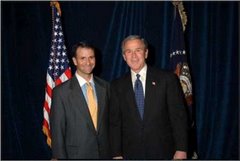 We are coming up on the five year anniversary of the occupation of Iraq, a country we now know beyond a shadow of a doubt had nothing to do with Al Qaeda, had no weapons of mass destruction, and was not seeking yellow cake uranium from Africa. Back when this illegal and immoral war was started a member of the Bush administration, Lawrence Lindsey, speculated that the conflict would cost 100 billion to 200 billion dollars and was ridiculed and subsequently fired for saying such a thing. We now are looking at a tab of close to a trillion dollars spent so far with a projected total bill for this war and the war in Afghanistan coming in at over three trillion dollars by the time it is all said and done. In the process of spending this obscene amount of money, we have lost nearly 4000 American troops, have ruined the lives of thousands more whose war wounds will never heal, who will never be able to regain the lives they once lead. Not to mention the Iraqis who have died, been displaced, wounded, and are living as refugees in conditions far worse than their pre-invasion situations. This entire fiasco rests heavily on the shoulders of Bush and Cheney who were the masterminds, organizers and cheerleaders for this debacle. Bush insisted on surging when we should have begun to pull out, Cheney sent in Halliburton and KBR to do the things that even desensitized soldiers would not do. They both together are responsible for the worst foreign policy disaster in which the United States has ever been involved. We still have not captured Osama Bin Laden, the situation in Pakistan is a mess, and Afghanistan is breeding more Taliban fighters than were there when we first invaded that country. All in all, nice job, Bush. We are more hated around the world, there is less respect for American foreign policy, our allies (?) are abandoning the fight against terrorism in which we are supposedly engaged. Thanks loads, George.
We are coming up on the five year anniversary of the occupation of Iraq, a country we now know beyond a shadow of a doubt had nothing to do with Al Qaeda, had no weapons of mass destruction, and was not seeking yellow cake uranium from Africa. Back when this illegal and immoral war was started a member of the Bush administration, Lawrence Lindsey, speculated that the conflict would cost 100 billion to 200 billion dollars and was ridiculed and subsequently fired for saying such a thing. We now are looking at a tab of close to a trillion dollars spent so far with a projected total bill for this war and the war in Afghanistan coming in at over three trillion dollars by the time it is all said and done. In the process of spending this obscene amount of money, we have lost nearly 4000 American troops, have ruined the lives of thousands more whose war wounds will never heal, who will never be able to regain the lives they once lead. Not to mention the Iraqis who have died, been displaced, wounded, and are living as refugees in conditions far worse than their pre-invasion situations. This entire fiasco rests heavily on the shoulders of Bush and Cheney who were the masterminds, organizers and cheerleaders for this debacle. Bush insisted on surging when we should have begun to pull out, Cheney sent in Halliburton and KBR to do the things that even desensitized soldiers would not do. They both together are responsible for the worst foreign policy disaster in which the United States has ever been involved. We still have not captured Osama Bin Laden, the situation in Pakistan is a mess, and Afghanistan is breeding more Taliban fighters than were there when we first invaded that country. All in all, nice job, Bush. We are more hated around the world, there is less respect for American foreign policy, our allies (?) are abandoning the fight against terrorism in which we are supposedly engaged. Thanks loads, George.This is all to say that we must end the wars if we want to begin to heal our international reputation, and we must make diplomacy our goal rather than aggressive attacks on other countries. Ending our involvement in wars/occupations abroad will have the added benefit of allowing us the funds to address some of our most egregious needs here at home. The mortgage and now growing credit crises are no doubt the result of deregulation and privatization of which the Bush administration is so fond. Paul Krugman, an economist, explained the impact of laissez-faire capitalism much better than I ever could in a recent NYTimes column (Betting the Bank).
War with Iraq - Costs, Consequences and Alternatives, American Academy of Arts and Sciences, an independent policy research center that conducts multidisciplinary studies of complex and emerging problems. A December 2002 report, published under the auspices of the Academy’s Committee on International Security Studies (CISS), finds that the political, military, and economic consequences of war with Iraq could be extremely costly to the United States. William D. Nordhaus (Yale University) estimates the economic costs of war with Iraq in scenarios that are both favorable and unfavorable to the United States. Steven E. Miller (Harvard University) considers a number of potentially disastrous military and strategic outcomes of war for the United States that have received scant public attention. Carl Kaysen (MIT), John D. Steinbruner (University of Maryland),and Martin B. Malin (American Academy) examine the broader national security strategy behind the move toward a preventive war against Iraq.

Blood for Oil (a great web site that has all kinds of graphics that you can download that will piss off the current administration!)
Check out Deja Vu All Over Again - an analysis of the scary news that the resignation of Admiral Fallon portends as far as an imminent attack on Iran, an excellent post that can be found over on the FourFreedoms blog.
A Crude Case For War? (Washington Post, March 16, 2008)

































































No comments:
Post a Comment